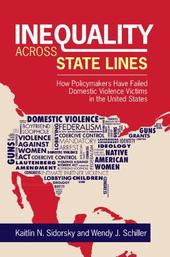
|
Inequality across State Lines: How Policymakers Have Failed Domestic Violence Victims in the United States
Paperback / softback
Main Details
| Title |
Inequality across State Lines: How Policymakers Have Failed Domestic Violence Victims in the United States
|
| Authors and Contributors |
By (author) Kaitlin Sidorsky
|
|
By (author) Wendy J. Schiller
|
| Physical Properties |
| Format:Paperback / softback | | Pages:262 |
|
| ISBN/Barcode |
9781009279161
|
| Classifications | Dewey:362.82920973 |
|---|
| Audience | |
|---|
| Illustrations |
Worked examples or Exercises
|
|
Publishing Details |
| Publisher |
Cambridge University Press
|
| Imprint |
Cambridge University Press
|
| NZ Release Date |
28 February 2023 |
| Publication Country |
United Kingdom
|
Description
In the United States, one in four women will be victims of domestic violence each year. Despite the passage of federal legislation on violence against women beginning in 1994, differences persist across states in how domestic violence is addressed. Inequality Across State Lines illuminates the epidemic of domestic violence in the U.S. through the lens of politics, policy adoption, and policy implementation. Combining narrative case studies, surveys, and data analysis, the book discusses the specific factors that explain why U.S. domestic violence politics and policies have failed to keep women safe at all income levels, and across racial and ethnic lines. The book argues that the issue of domestic violence, and how government responds to it, raises fundamental questions of justice; gender and racial equality; and the limited efficacy of a state-by-state and even town-by-town response. This book goes beyond revealing the vast differences in how states respond to domestic violence, by offering pathways to reform.
Author Biography
Kaitlin N. Sidorsky is an Associate Professor of Political Science at Coastal Carolina University. She is the author of All Roads Lead to Power: Appointed and Elected Paths to Public Office for US Women (2019). Wendy J. Schiller is Professor of Political Science and Director of the Taubman Center for American Politics and Policy at Brown University. Her publications include Dynamics of American Democracy (2021), Electing the Senate: Indirect Democracy before the Seventeenth Amendment (2015), and Partners and Rivals: Representation in US Senate Delegations (2000).
Reviews'Too often political scientists focus narrowly on institutions and behaviors, overlooking the critical policy implications of political behaviors and institutional structures. Policy scholars seldom explore the political circumstances defining and even reorienting public policies. Sidorsky and Schiller address both. In Inequality across State Lines, Sidorsky and Schiller examine federal and state policies affecting domestic violence. Their work combines a keen sense of federal policy development and implementation with a clear presentation of the effects of our federal structures on the implementation of laws related to domestic violence (DV). Sidorsky and Schiller find that for victims of DV the political ideology and firearm laws where they live often dictate their fate. Too often, DV attacks are met with indifference from government officials and the public. Sidorsky and Schiller have produced an important work at a critical time.' Scott Ainsworth, University of Georgia 'Domestic violence is a life-and-death issue. It's also a powerfully gendered problem. Using gun laws and their implementation as a case study, the authors show how U.S. federalism intersects with gender and racial hierarchies to create a legal system where not all women are protected equally. This policy failure has profound consequences not only for women's physical and emotional well-being, but also potentially for their civic life.' Kristin A. Goss, Duke University 'Why do state and national policies fail to protect women from domestic violence? With insightful analysis, Sidorsky and Schiller implicate uneven state reactions to federal laws, gun rights trumping domestic violence concerns, and a system of federalism that exacerbates inequality. Their compelling call to action offers hope toward a path forward.' Craig Volden, University of Virginia
|